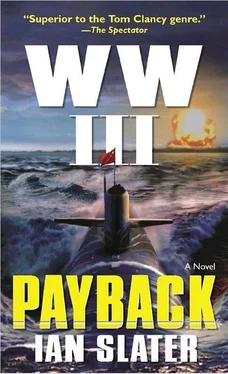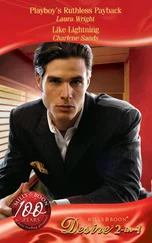Seeing a tank in such a mode, Rhee quickly recalled NKA officers such as Colonel Kim and Major Park referring to ineffective T-55s as “Kofi Annans” —all noise and little action. Now even NKA infantry fire was falling off for lack of targets. Then he heard the guttural cough from the tank’s cluster of grenade/flare-popping tubes firing a salvo of high search flares into the Americans’ fortuitous fog cover. The flares burned with such intensity as they descended beneath their chutes that their light “bloomed” out Rhee’s binoculars, the latter’s filter to no avail.
While swearing at the stupidity of the T-55’s commander for, albeit unknowingly, whiting out his ChiCom binoculars’ IR capability and making his eyes water copiously in the backwash of the astringent phosphorus, Rhee saw something with the naked eye at about the point where his IR binoculars had picked up the umbrella of heat. It looked for all the world like a huge, truncated cigar casing, a massive version of the cigar tubes that held the NKA senior officers’ Havana cigars. Then he saw two — or was it three? — figures by it. Given the fog-curtained dawn, it was impossible to make out whether they were swimming or hanging on to the thing. Then as quickly as he’d cursed the tank commander, Rhee was praising his commander in arms, the phosphorus flares so hot they were creating burn holes in the fog over the beach and surf, one of these holes providing Rhee with a temporary window through which he plainly saw the bulbous bow of the craft and its strange back-to-front appearance, as if its bow was its stern and vice versa.
It didn’t matter to Rhee exactly what it was. All he knew was that it was well within range of his bunker’s heavy 12.7mm machine gun. The weapon’s mid-gun sight was warped, but the target was only about two hundred yards away at most. If he couldn’t get one or two rounds into it with the 700-rounds-a-minute Sky Arrow, he should be put on public latrine duty where everyone from old NKA veterans to young girls had posters of the current American President plastered on urinals and in toilet basins to aim at.
He flicked off the safety and, using the palm of his left hand to steady the gun’s stock, squeezed the trigger. If the blowback noise took him by surprise, it also startled Freeman and Aussie, the last of the six-man Payback team to reach the RS as fog rushed in again to fill the temporary vacuum that had been created by the phosphorus flares’ burn-off of oxygen. Worse, while most of the big 12.7mm antiaircraft slugs chopped futilely into the cold and angry surf, at least two rounds struck the bulbous bow.
“Jesus!” shouted Aussie as he momentarily lost his grip, while helping the wounded Bone. Brady, despite having managed to jerk down the pull tab on his Mae West earlier with his free hand before being knocked under, was having to struggle to stay upright long enough for Freeman and Aussie to help pull and push him up to the RS’s starboard retractable stabilizer canard, which doubled as both handhold and footstep up to hatch two, hatch one having been ordered closed by Eddie Mervyn to prevent more of the kind of flooding that had followed Salvini and the MANPAD box in as it was dragged and bullied down at a near-impossible angle through hatch one into the RS’s belly.
“C’mon, Bone!” Aussie yelled. “Shake a leg, mate, or we’ll be fucking paté !”
Freeman retrieved Bone by grabbing his left shoulder, Brady’s scream so loud Gomez thought his wounded comrade was done for, but then Bone was knocked from the general’s grasp by a wave and disappeared.
Rhee fired again, his left hand sliding inadvertently on the rain-slicked stock, unwittingly depressing the barrel’s angle of fire. On the beach there were other screams and shouts as an errant burst from the fog-shrouded bunker fell short of the RS, chomping instead into a squad of NKA infantry. The latter, having become suddenly impatient with the T-55’s cautious progress on the wet sand, had rushed forward toward the roaring but fog-hidden surf, afraid that the enemy might slip away due to one of those incidentals that civilian know-it-alls find inexplicable but which men at arms experience more often than is ever recorded. For the moment that the tank commander, now doing an Israeli, standing up for better vision in the tank’s cupola, his only protection that of the ribbed leather helmet, saw the infantry squad’s bodies being literally butchered by very heavy machine-gun fire, he surmised that his tank and its attendant infantry were coming under a rearguard fire from the bunker. The cagey Americans, he had assumed, had left one or perhaps two of their number in the bunker to delay — or rather, ambush — the NKA’s progress down the slope and onto the beach, buying their fellow gangsters time to get away. In a second the tank commander slewed the T-55’s turret 180 degrees, shouting to his crew that they were taking fire from the rear. “ Cha-ja! — Find it!” he shouted into his mike. “Cha-ja!”
Though he couldn’t be heard over the tank’s internal radio circuit, all NKA frequencies continuing to be jammed by Blue Tile’s satellite-directed down-beams via the E2-F Hawkeye, the commander’s voice was so loudly urgent that it cut through the howl of the tank’s twelve-cylinder 580 hp diesel in the rear of the tank’s hull, both the cupola’s 115mm and its slaved 7.62 coaxial machine guns opening up on the tongue of flame from Rhee’s Sky Arrow barrel.
Rhee, his cell phone useless, yelled frantically, waving the cell, hoping that at least its plastic casing would be glimpsed by either the tank’s commander standing up in his cupola or the driver, through his vision slit. The big V-12 engine coughed out more filthy exhaust, which, while exiting seaward, washed back over the cupola, the airborne hydrocarbon fumes momentarily engulfing the commander as the tank, having used its coaxial machine gun as a subcaliber ranging gun for the T-55 main gun tube, bucked hard and belched bloodred. The fume extractor halfway down the barrel was still smoking, as the tube’s second shot erupted, sending a HEAT — high explosive antitank — round streaking up at over a thousand yards a second toward the cunningly concealed slit-eye rock bunker 180 yards to the west, striking it with 200-tons-per-square-inch pressure.
Rhee, in the fetal position, was unable to hear anything, not even the normal sounds of silence, as he was flung about the ten-foot-long bunker like a doll, his helmet smashing into the far rock wall with such force that the concussion stunned him into a sense of nothingness, only a suggestion of feeling throughout his body, as if he’d been inside some huge cement mixer but no longer knew where the exit was amid the warm, smoking debris in the pitch-black darkness.
He could barely move — he must be covered in rubble, the only sound now distinguishable being that of the sea. His lack of pain tempted him to think he had escaped any additional injury. Or perhaps it was such a massive wound that feeling had deserted him altogether in the throes of death? He sat there in the stone-cold darkness, peering into what, he wasn’t sure — a mixed debris of dank earth and shattered rock? He guessed he’d been there for five, possibly ten minutes — his watch was smashed. It was only a cheap Dear Leader II — but its loss made him anxious and angry. On his meager salary it had been a major purchase. He could not hear any firing. Either it had stopped down on the beach or he was covered by so much rubble that he couldn’t hear it.
The fact was that he had been there for only less than a minute, his body in shock, his mind trying to catch up, but knowing he was dying.
Down on the fog-shrouded beach, the NKA, now more circumspect, had gone to ground, or at least into any depression they could find at the base of the big dune, the tank having dug into defilade position. With only the tortoiselike curve of its cupola showing, its machine-gun fire hosed back and forth along the crescent beach while the tank popped more flares high into the fog, trying to relocate the craft several of the NKA infantry had claimed to see and toward which they had tried to direct the tank’s fire. Without their radios working, however, it was more a waste of ammunition, despite the lucky hits on the RS’s bow, which, while not penetrating the specially rolled high-tensile composite and steel casing of the craft, had pulverized its forward sonar sensors.
Читать дальше












